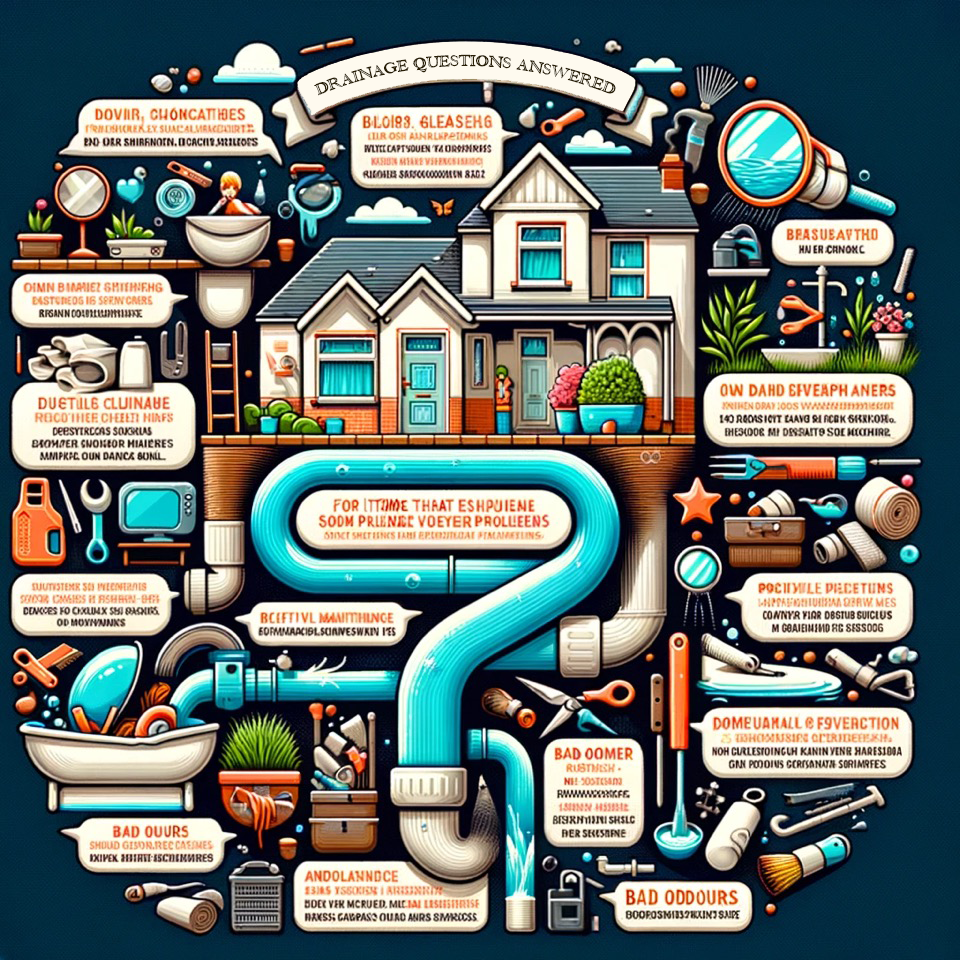Unblocking the Mysteries: Common Domestic Drainage Questions Answered for UK Homeowners
The drainage FAQ page is new in February 2024 and is expected to have a navigation system to new exciting articles soon.
Dealing with domestic drainage issues can be a daunting task for many UK homeowners. From slow-draining sinks to the best practices for maintenance, the intricacies of the UK's drainage systems often lead to a flood of questions. This article aims to clear the waters by addressing some of the most common domestic drainage queries, providing essential insights and solutions.

Why Do My Drains Smell Bad?
Bad smells from drains are typically caused by a buildup of debris, such as food particles, grease, and soap scum, which can decompose and produce unpleasant odours. Another cause could be a dry P-trap, especially in drains that are seldom used, allowing sewer gases to rise into the home. Regular cleaning and flushing with hot water can prevent these odours. If the smell persists, it might indicate a blockage or a problem with the sewer line that requires professional attention.
What Causes Blocked Drains?
Blocked drains are usually the result of materials that shouldn't be disposed of via the drain, including cooking fats and oils, hair, coffee grounds, and non-biodegradable items like wipes and sanitary products. These substances can accumulate over time, causing obstructions. To prevent blockages, be mindful of what goes down your drains and consider using drain guards to catch hair and other debris.
How Can I Clear a Blocked Drain?
For minor blockages, a plunger or a plumber's snake (drain auger) can often do the trick. Baking soda followed by vinegar can also be effective for clearing blockages naturally. However, for more stubborn blockages or if you're unsure of the cause, it's best to call a professional plumber or drainage expert to avoid causing further damage.
Can I Prevent My Drains From Getting Blocked?
Preventative maintenance is key to keeping your drains clear. Regularly cleaning your drains, being cautious about what goes down them, and using strainers to catch debris can significantly reduce the risk of blockages. Additionally, periodic professional cleaning can help remove any buildup before it becomes a problem.
When Should I Call a Professional for Drainage Issues?
While some minor blockages can be resolved with DIY methods, there are several signs that you should call a professional, including:
- Persistent bad odours that don't go away with cleaning
- Recurring blockages or multiple blocked fixtures
- Water flooding in your garden or near your home's foundation
- Gurgling sounds from drains or toilets
These symptoms may indicate a more serious issue that requires professional diagnosis and repair.
Is Drainage Maintenance Covered by Home Insurance?
Coverage for drainage issues varies by policy. While some home insurance policies might cover damage caused by blocked drains, they typically don't cover the cost of clearing blockages or routine maintenance. It's essential to review your policy details or speak to your insurer to understand what is and isn't covered.
Conclusion: Understanding and properly maintaining your home's drainage system can save you from the inconvenience and expense of blockages and related issues. By following best practices for disposal and conducting regular maintenance, you can keep your drains flowing smoothly. Remember, when in doubt or faced with persistent problems, it's always safest to consult with a professional to ensure your drainage system remains in top condition.